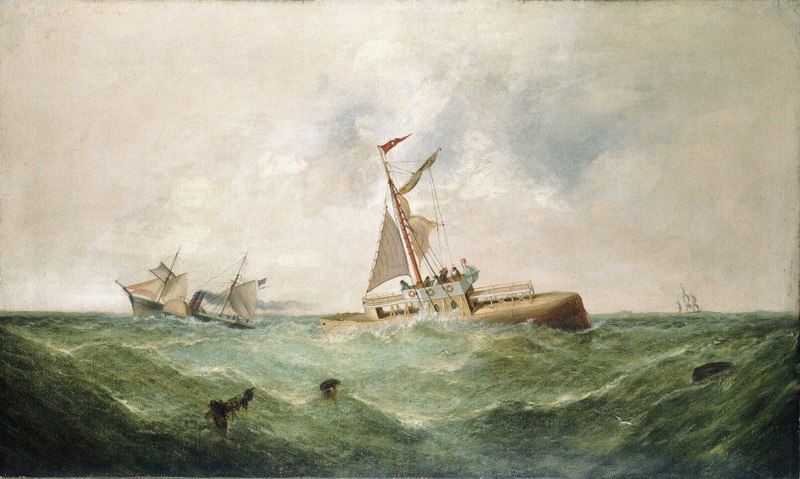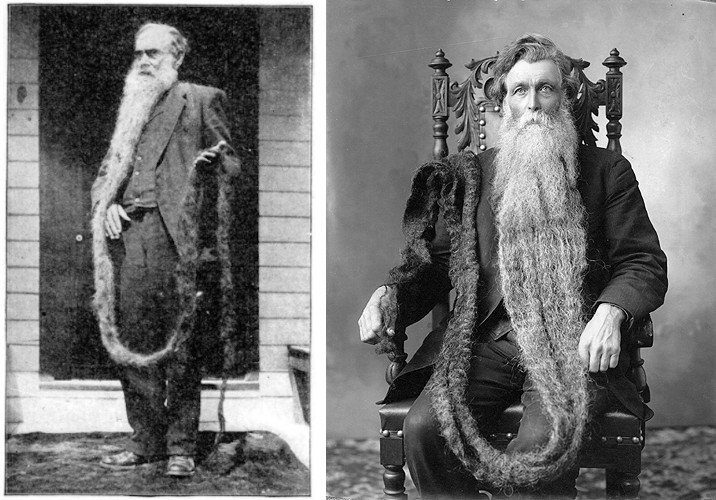A jailer will send each of a group of n prisoners alone into a certain room. Each prisoner will visit the room infinitely often, but the order of the visits will be determined arbitrarily by the jailer. The prisoners can confer in advance, but once the visits have commenced they can communicate with one another only by means of a light in the room, which they can turn on or off. How can they ensure that some prisoner will eventually be able to determine that everyone has visited the room?
The Endless House
In 1924 architect Frederick Kiesler proposed a house fashioned as a continuous shell rather than an assembly of columns and beams:
The house is not a dome, but an enclosure which rises along the floor uninterrupted into walls and ceilings. Thus the safety of the house does not depend on underground footings but on a strict coordination of all enclosures of the house into one structural unit. Even the window areas are not standardized in size or shape, but are, rather, large and varied in their transparency and translucency, and form part of the continuous flow of the shell.
Storage space is provided between double shells in the walls, radiant heating is built into the floor, and there are no separate bathrooms, as bathing is done in the individual living quarters.
“While the concept of the house does not advocate a ‘return to nature’, it certainly does encourage a more natural way of living, and a greater independence from our constantly increasing automative way of life.”
(Via Ulrich Conrads, The Architecture of Fantasy: Utopian Building and Planning in Modern Times, 1962.)
Certainty
“Suppose a contradiction were to be found in the axioms of set theory. Do you seriously believe that that bridge would fall down?” — Frank Ramsey, to Wittgenstein
“Does anyone believe that the difference between the Lebesgue and Riemann integrals can have physical significance, and that whether, say, an airplane would or would not fly could depend on this difference? If such were claimed, I should not care to fly in that plane.” — Richard W. Hamming
Podcast Episode 335: Transporting Obelisks

In the 19th century, France, England, and the United States each set out to bring home an Egyptian obelisk. But each obelisk weighed hundreds of tons, and the techniques of moving them had long been forgotten. In this week’s episode of the Futility Closet podcast we’ll follow the struggles of each nation to transport these massive monoliths using the technology of the 1800s.
We’ll also go on an Australian quest and puzzle over a cooling fire.
If You Can’t Beat ‘Em …
A French Prisoner in Norman Cross Barracks, had recourse to the following stratagem to obtain his liberty:–He made himself a complete uniform of the Hertfordshire Militia, and a wooden gun, stained, surmounted by a tin bayonet. Thus equipped, he mixed with the guard, (consisting of men from the Hertford Regiment,) and when they were ordered to march out, having been relieved, Monsieur fell in and marched out too. Thus far he was fortunate, but when arrived at the guard-room, lo! what befel him. His new comrades ranged their muskets on the rack, and he endeavoured to follow their example; but as his wooden piece was unfortunately a few inches too long, he was unable to place it properly. This was observed, and the unfortunate captive obliged to forego the hopes of that liberty for which he had so anxiously and so ingeniously laboured.
— The Soldier’s Companion; or, Martial Recorder, 1824
The first escape from [Dartmoor Prison] took place five days after the first draft arrived. Sevegran, a naval surgeon, and Auvray, a naval officer, having observed that a guard of fifty men marched into the prison every evening to assist in getting the prisoners into their respective halls if required, made themselves glengarries and overcoats, and strips of tin looking like bayonets at a distance, and fell in at the rear of the detachment as it marched out. Favoured by the rain which was falling heavily at the time they passed all the gates unquestioned, and as the company wheeled towards the barracks, they left it, and went on through the village towards Plymouth. Speaking English fluently and being well provided with money, they had no difficulty in booking seats for London on the coach.
— Basil Thomson, The Story of Dartmoor Prison, 1907
Lessons Learned
Excerpts from the Evil Overlord List, compiled in 1990 by the FidoNet Science Fiction and Fandom email echo:
If I were the Evil Overlord …
- If I have several diabolical schemes to destroy the hero, I will launch them all at once rather than singly, thereby saving myself the aggravation of watching them fail in succession.
- If I decide to hold the double execution of the hero and an underling who betrayed me, the hero will be scheduled to go first.
- Shooting is not “too good” for my enemies.
- My force field generators will be located inside the force field they generate.
- My Legions of Terror will have helmets with clear, space-age-plastic faceplates that allow the troopers to see clearly, and allow others to identify the trooper by sight with ease.
- I will occasionally listen to and follow my advisor’s advice.
- Despite the delicious irony, I will not force two heroes to fight each other in the arena.
- I will be secure in my superiority. Therefore, I will feel no need to prove it by leaving clues to my Master Plan in the form of riddles for my enemies to find.
- No matter how much I desire vengeance, I will never issue the order, “Leave him! He’s mine!”
- My noble half-brother, whose throne I usurped to come into power, will not be secretly kept imprisoned anonymously in a cell in my dungeon. He will be killed as soon as my coronation is over.
Express

This is just pleasing somehow: The Japanese railway station with the shortest name is Tsu Station in Mie Prefecture.
The name is written with a single stroke.
Chin King

By 1910, Valentine Tapley was claiming to have the longest beard in the world, at 12 feet. His congressman in Missouri would even boast about the achievement and defend Tapley against other claimants. (It’s sometimes said that Tapley was a Democrat and had vowed never to shave again if Abraham Lincoln won the election.)
But it appears that the real record was held by a contemporary, North Dakota farmer Hans Langseth, who’d begun growing his beard in 1865 as part of a contest. By the time of his death in 1927, it measured 17.5 feet, and it’s now held by the Smithsonian Institution.
I can’t find any record that these two even knew of one another.
Being There
Suppose we divide a group of 100 women randomly into two groups, one of 95 and the other of 5 women. Then by flipping a fair coin we randomly assign the name “the Heads group” to one group and “the Tails group” to the other. Now philosopher John Leslie suggests that “[e]stimated probabilities can be observer-relative in a somewhat disconcerting way”:
All these persons — the women in the Heads group, those in the Tails group, and the external observer — are fully aware that there are two groups, and that each woman has a ninety-five per cent chance of having entered the larger. Yet the conclusions they ought to derive differ radically. The external observer ought to conclude that the probability is fifty per cent that the Heads group is the larger of the two. Any woman actually in [either the Heads or the Tails group], however, ought to judge the odds ninety-five to five that her group, identified as ‘the group I am in’, is the larger, regardless of whether she has been informed of its name.
Even without knowing her group’s name, a woman could still appreciate that the external observer estimated its chance of being the larger one as only fifty per cent — this being what his evidence led him to estimate in the cases of both groups. The paradox is that she herself would then have to say: ‘In view of my evidence of being in one of the groups, ninety-five per cent is what I estimate.’
Whether this is really a paradox is disputed — Oxford philosopher Nick Bostrom, in his 2002 book Anthropic Bias, points out that these are different judgments: The woman is considering the probability that she finds herself in the larger group, and the external observer is considering the assignment of labels to the groups. Bostrom describes a variant “where chances are observer relative in an interesting, but not paradoxical way” (page 129).
(John Leslie, “Observer-Relative Chances and the Doomsday Argument,” Inquiry 40:4 [1997], 427-436.)
Provisions

Good Fortune Burger of Toronto has named its menu items after office supplies so that customers can include them on expense reports:
Fortune Burger: Basic Steel Stapler
Diamond Chicken Burger: Mini Dry Erase Whiteboard
Double Your Fortune Burger: Ergonomic Aluminum Laptop Stand
Emerald Veggie Burger: Wired Earphones With Mic
Parmesan Fries: CPU Wireless Mouse
Ginger Beer: Yellow Lined Sticky Notes
San Pellegrino: Ball Point Black Ink Gel Pens
Build Your Fortune Burger: Silicone Keyboard Cover
“There’s no malice intended in it,” Director of Operations Jon Purdy told blogTO. “It’s all just fun and games.”
